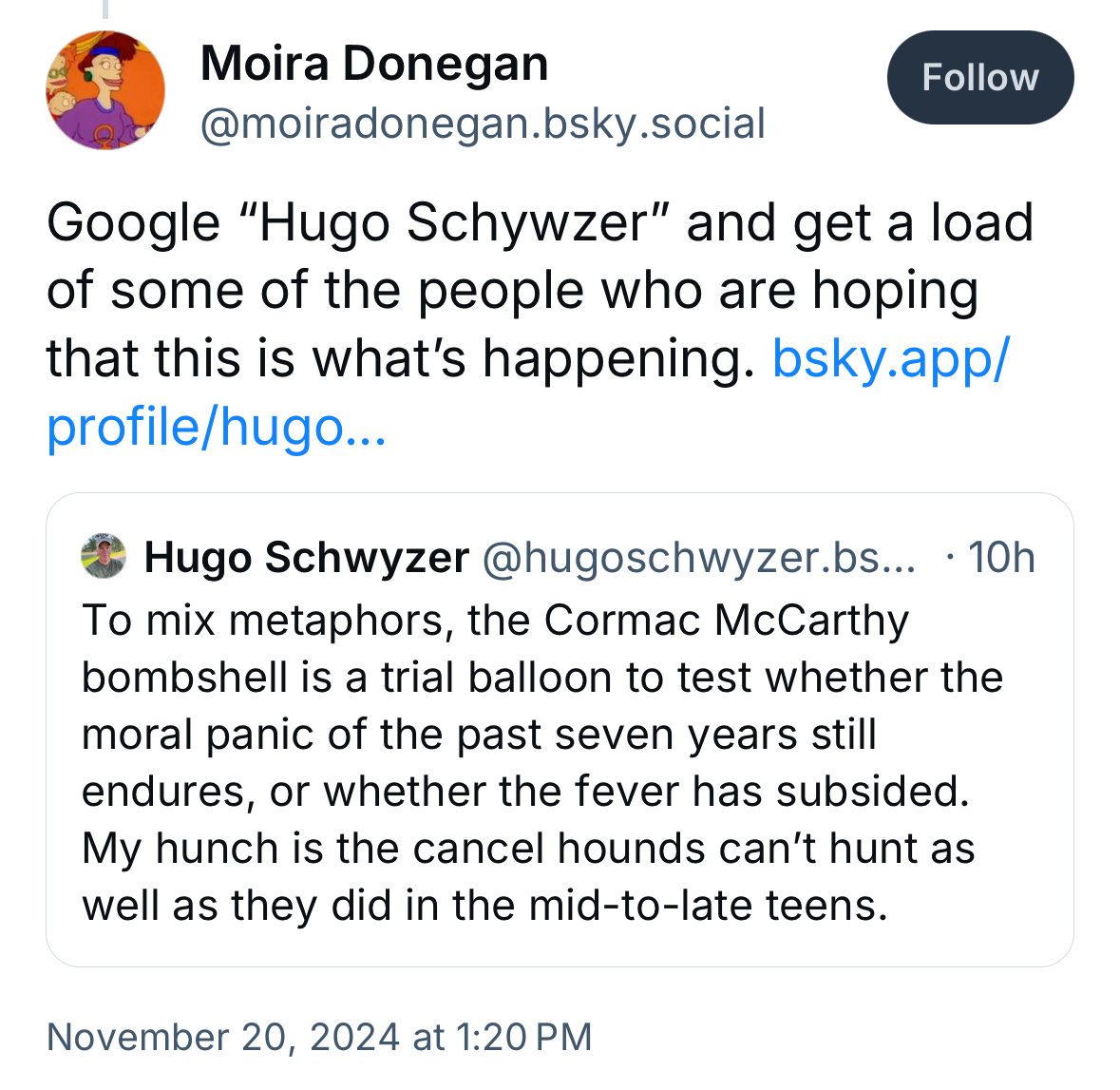Hi! My Substack remains free to all readers.
I do, however, welcome financial support. Your contributions – whether one-time or recurring, large or small, help me take care of my kids and continue to make writing a full-time occupation. I have an account on the platform Buy Me a Coffee, and you can do just that (in one-time $5 increments), or choose to become a patron. There is no obligation, only my immense gratitude. Thank you!
“I’m about to tell you the craziest love story in literary history.”
Those words belong to the splendidly named Vincenzo Barney. They appear in today’s Vanity Fair, the opening sentence of a very, very long read. Barney’s article, Cormac McCarthy’s Secret Muse Breaks Her Silence After Half a Century: “I Loved Him. He Was My Safety,” comes in at a whopping 11,000 words, but I read it in what seemed to me like moments. And I wept when I was done.
Cormac McCarthy died last year, widely regarded as one of the pre-eminent American novelists of the post-war era. Several of his books, most notably No Country for Old Men, have been turned into acclaimed films. McCarthy is a famously unsparing and exact writer. Not everyone admires his prose, but not everyone admires Henry James or F. Scott Fitzgerald, either. In any event, Barney’s long (and no doubt, somewhat overwritten) essay is based on a series of interviews with Augusta Britt, McCarthy’s long-time lover, companion, and muse.
Britt, we learn, first met McCarthy when he was 42 and she just 16. They fell in love. They first slept together the next year:
He was 43, she was 17. The image is startling, possibly illegal. At the very least, it raises questions about inappropriate power dynamics and the specter of premeditated grooming. But not to Britt—who had suffered unspeakable violence at the hands of many men in her young life—then or now.
“I can’t imagine, after the childhood I had, making love for the first time with anyone but a man, anyone but Cormac. It all felt right. It felt good,” she tells me. “I loved him.”
I am not going to recap the entire piece. You can read it or not, and you may be moved as I was, or you may be revolted, or you may be exasperated. I’ve already said it made me cry, and you can imagine the rest of my feelings given my own history. I’ll leave that there. What matters isn’t how it made me feel, or how it makes you feel. What matters is that Vanity Fair – still one of the preeminent American magazines – greenlit the Vincenzo Barney piece and ran it. What matters is that Barney’s tone is one of deep and justified admiration for Cormac McCarthy, and even greater admiration for the extraordinary force of nature that is Augusta Britt.
What matters is that while the article pays cursory lip service to “inappropriate power dynamics” and “premeditated grooming,” Vanity Fair frames the romance between Britt and McCarthy not as problematic, immoral, or exploitative – but as one of the great love stories of all time. (Greater, Barney suggests in the gloriously hyperbolic opening paragraph, than “Dante and Beatrice, Scott and Zelda, Véra and Vladimir.” ) What matters is that Vanity Fair has looked squarely at the excesses of the #MeToo movement and said, “Y’all don’t get to shape the narrative without some pushback.” Yes, “inappropriate power dynamics” can be real. But so too is young women’s agency. So too is the possibility of real love despite all the real inequalities.
To the extent that the #MeToo movement called out genuinely predatory men – the Weinsteins, the Cosbys, the Epsteins, the R.Kellys – it did an unquestioned service. Too many violently abusive men got away with sexual assault for too long. The #MeToo movement, of course, was not a monolith. It had no headquarters, no web address, no staff of lawyers. It was a vibe, but a powerful one. And soon after its initial triumphs, that vibe began to make broader claims. Not only was rape bad (which it is), but all age-gap relationships between older men and younger women were inherently problematic. The #MeToo movement insisted, to one degree or another, that young women’s agency was oversold if not downright illusory. Indeed, between 2017 and 2023, the general view was that young women’s erotic “agency” was nothing more than a deceptive strategy, deployed by predatory men to mislead vulnerable young women into believing that they wanted what they in fact did not.
To the truly awakened mind, not only does “no” mean “no,” but even a sober, enthusiastic, libidinous “hell, yes” still means “no” if it is uttered by a younger woman to an older man with more professional, financial, or social power than she. If a woman continues to insist on her agency? Well, poor thing, she’s engaged in internalized oppression. She has a false consciousness. She’s sicker than she realizes.
In 2020, one can imagine Vanity Fair assigning a Vincenza Barney to write this piece. She’d worm her way close to Augusta Britt, and then – having collected all the evidence and anecdote she needed – she’d pen a devastating takedown of the great writer. Britt would come across as a delusional victim, clearly still grappling with enormous trauma, her refusal to condemn the man who assaulted her serving as prima facie evidence that she remains tragically unwell, deserving of our sympathy - but not our assent to her version of events. There would be calls to remove McCarthy from the libraries and the syllabi.
2024 is not 2020.
It takes time to research and write a gripping, incandescently composed 11,000-word article. (Even if you find Barney’s prose embarrassingly purple, and you wonder what his editors were smoking, you still can concede it probably took him a while to bang it out.) In other words, this piece was finished, edited, and fact-checked well before Donald Trump’s re-election. This shift in the Zeitgeist – back towards crazy love stories with big age gaps, and back towards an acknowledgement that even very young women can have very real agency – was underway well before November 5.
Even if Kamala Harris had easily prevailed earlier this month, the excesses of the #MeToo movement were already being repudiated. See, for example, the collective shrug on the left at the news that Harris’ husband, Doug Emhoff, had been left by his first wife after she discovered that he had had an affair with the couple’s much younger nanny. The willingness to overlook this indiscretion was almost Clintonian; the media’s focus was instead on the warm, cordial relationship between Douglas Emhoff and his former wife. So civilized. So… unproblematic.
On social media, you’ll still find plenty of appalled millennials declaring that they “can’t even” with the Vanity Fair piece. I wrote an initial response on BlueSky – and the writer renowned for having created the Shitty Men in Media blacklist quoted me.
It's not just what I hope is happening, though I am always happy when revolutions calm down. Thermidor was a considerable improvement on the Terror. Deng Xiaoping was vastly preferable to the Gang of Four. Giuliano de Medici was a great relief after Savonarola and his bonfires. As for us, an end to something dark and cruel is what is happening. And purple prose or no, Vincenzo Barney’s take on love, sex, literature and agency is a damn sight better than the prim, joyless, and censorious orthodoxies of the last seven years.
Augusta Britt is a hero for the ages, as I hope you’ll read. Only peevish and impoverished times would see the likes of her as a perpetual victim. In celebrating her power, and in celebrating her great love with and for the great writer, we see a long overdue restoration of common sense about men, about women, and about the sublime marrying of the creative and erotic instincts.
One of McCarthy’s most quoted sentences begins: They rode on and the sun in the east flushed pale streaks of light….
This essay is one of those streaks. It’s been a long night. Here comes the overdue and most welcome dawn. Time to wake up.





Great love stories of all time? Seems to me, after reading the article, that it was the same old, same old. Young troubled, abused, foster child happens to arouse older guy who instead of guiding a young person becomes part of the abuse cycle. Troubled, abused teen, experiences kindness and safer harbour and in return gives what she has to him - sex. Look up "sexual grooming" please. I don"t doubt she loved him. She feels he saved her. But in fact she saved herself by moving on. I don't place any responsibility on her. The writer can get watery eyed on the "romance", I'll just wish Augusta Britt all the best.
I was already raising my eyebrow at the title, but when I got to the part where you invent a little fantasy about a conniving woman to get mad about, I knew I was reading something written by a deeply disturbed person who hates women. I had to know more!
How convenient that Wikipedia informed me you were fired for fucking your students, once tried to kill your girlfriend, and admitted “I am a danger to myself and others.” Man no shit. You really aren’t doing yourself any favors posting this little rant.
Why would you EVER go into gender studies? Was it an attempt to rationalize your demons or something?